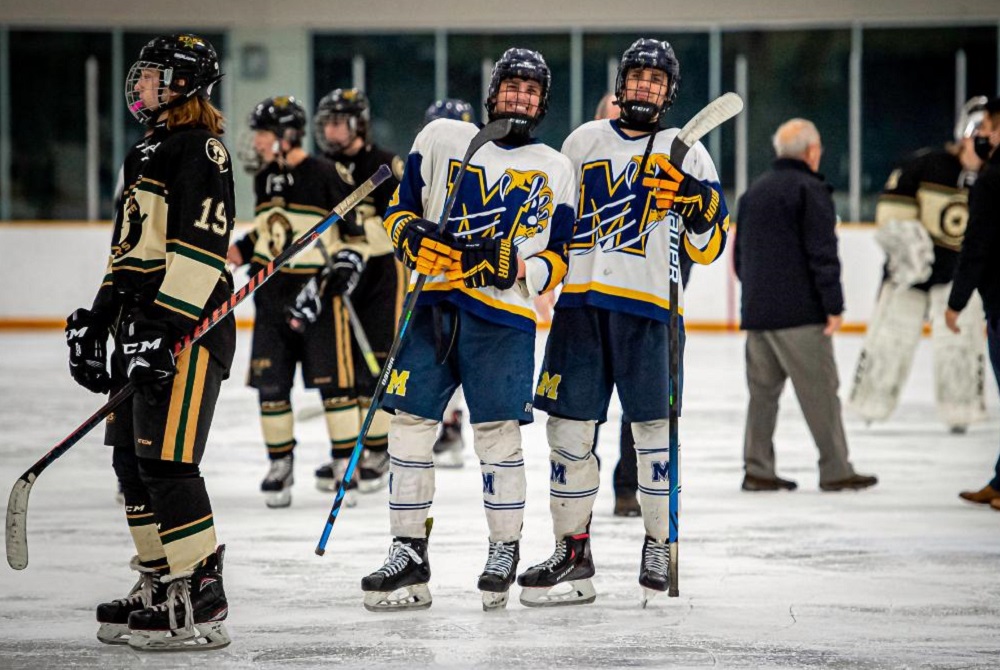
Kruzich Family Connections Run Deep Through Mattawan Hockey, Rivalry
By
Pam Shebest
Special for MHSAA.com
January 17, 2023
MATTAWAN — When this season’s South Central High School Hockey League schedule was announced, twins Kaleb and Zach Kruzich immediately circled Feb. 15.
 That’s the red-letter day their Mattawan Wildcats face off against the Kalamazoo Eagles, coached by their uncle, Matt Kruzich.
That’s the red-letter day their Mattawan Wildcats face off against the Kalamazoo Eagles, coached by their uncle, Matt Kruzich.
“When Matt told me he was coaching the Eagles (three years ago), he said, ‘I don’t even want you to look at me (during the game),’” Zach Kruzich laughed.
“‘I don’t even want to talk to you at the rink,’ which is perfectly fine by me.”
Adding to the family dynamics, the twins’ father, Bart, is assistant coach with Wildcats’ head coach, Chris Dienes.
“We always really get up for that game, for sure,” Bart Kruzich said. “They beat us last year, so we definitely remember that. It’s always a big game.”
Off the ice, it is back to family.
“We all live on the farm, so we’re all very close and see each other every day,” Matt Kruzich said.
In addition, Dienes and Matt Kruzich are roommates.
“Out of hockey, most of the topics are about fantasy football than hockey,” Kaleb Kruzich said.
Hockey aside, the twins are, so far, the last of four generations of Wildcats.
Their great-grandmother, the late Emma Papierz Kruzich; their grandfather John Kruzich, and their dad all graduated from Mattawan High School.
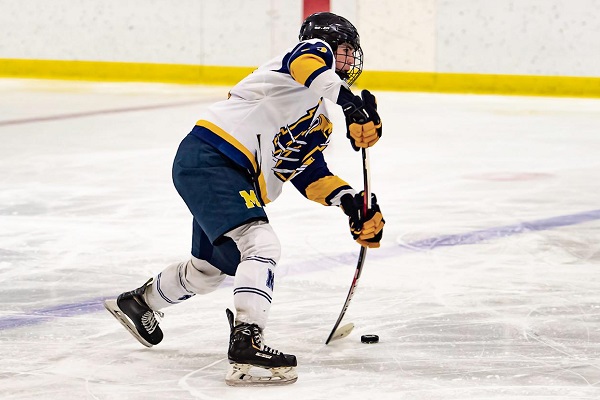 As for hockey, “We were born into it,” laughed Zach Kruzich.
As for hockey, “We were born into it,” laughed Zach Kruzich.
Their dad played for the Junior K-Wings from 1991-93.
Uncle Matt played professionally for the United Hockey League Kalamazoo Wings in 2002-03.
Oldest brother Jake also played for the Wildcats before continuing as a student only at Michigan State.
Dienes, in his second year as the Wildcats’ head coach, also brings a wealth of hockey experience to the team.
After playing at Western Michigan University from 2013-17, he played professionally for the ECHL’s Adirondack Thunder and Jacksonville Icemen, and then with the American Hockey League’s Manitoba Moose in 2017-18.
The twins figure this is their last year of organized hockey — they are not planning to play in college — so they are going all out.
Kaleb is a left-handed defenseman wearing No. 13, and Zach a right-handed forward sporting No. 19.
That is the easiest way the tell them apart.
“My grandparents can never tell who’s who on the ice,” Kaleb said. “They need our numbers. A lot of the fans are the same. They need a roster to differentiate.”
Dienes said he also has trouble telling the twins apart.
“Sometimes I get caught yelling at one and it’s not the right one, but I can tell them apart on the ice easy,” he said.
The twins complement each other during games, but practices are quite a bit different.
“I’m always like, ‘Can I skip you so I can go against Kaleb?’” Zach said. “In games, we’re just teammates.”
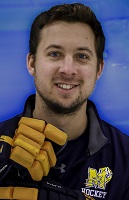 Kaleb also looks forward to practices, saying he and his brother grew up competing against each other.
Kaleb also looks forward to practices, saying he and his brother grew up competing against each other.
“We definitely try our hardest against each other in practice,” he said. “Definitely some slashes, some punches thrown on the ice, just like quick stuff. It happens. Brothers being brothers, especially when we’re the same age.”
Dienes and Bart Kruzich have an understanding when it comes to coaching.
“He does a good job,” Dienes said. “He allows me to do the coaching of them for the most part. It’s a good mix of me being bad cop sometimes and him being good cop, which is good for him as a dad.”
Bart Kruzich said he talked at length with Mattawan athletic director Chad Yager and Dienes before agreeing to become assistant coach.
“For the most part, I don’t really coach a lot to my own kids. That was an agreement I made with Chris and Chad Yager,” Bart Kruzich said.
“I’m probably harder on my own kids than I am on the others. They’re used to it. It’s been like that since they were 6 years old, and now they’re 18.”
So far, the Wildcats have a 7-4-2 record, 5-1 in the league, where they and Jackson Lumen Christi are the only teams who are not cooperative programs. The co-ops are the Portage Muskies, Kalamazoo United, Kalamazoo Eagles, Kalamazoo Blades, Capital City, and Eastside.
“Our numbers have actually grown over the years,” Dienes said of his team. “When I first started as an assistant (two years ago), we had 21 kids try out.
“Last year we had 39, and this year we had 40. I think that number is going to continue to grow over the years, so it’s exciting.”
The Wildcats won their first playoff game in 10 years last season and hope to build on that.
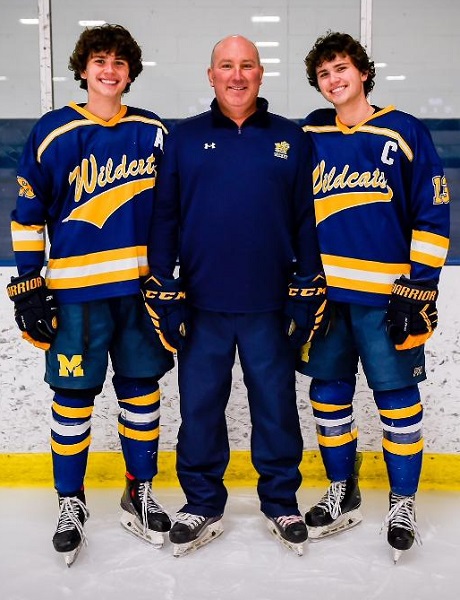 “The twins and our senior leaders – Colin Swintz, Colin O’Reilly, Aidan Warn and Niko Lewis – have really led the charge,” Dienes said.
“The twins and our senior leaders – Colin Swintz, Colin O’Reilly, Aidan Warn and Niko Lewis – have really led the charge,” Dienes said.
Juniors are Colin Porn, Matt Novak, Landis Mills, Jake Mandeville, Gavin Mckeeby, Brody Schripsema, Nathan Whitehead, Nicholas Amos and Edmond Lafleche. Sophomores are Dom Vezeau, Carson Mattern, Carson Smith, Caden Byers, Kibwe Weaver and Brayden Lewis.
Zach Kruzich said most of his teammates have played together since youth hockey which, along with being at the same school, is a big advantage.
Another strength is team depth, Bart Kruzich said.
“This year, we have 13 forwards and six defensemen, and we feel like we can put any of those 13 forwards out there and we’re competitive with all 13 of those kids,” he said.
“When we get into a good game, we can roll three and one-half lines and kind of tire teams out. Our talent pool is pretty deep.”
While the twins are enjoying their senior year on the ice, neither plans to continue hockey in college. Both hope to attend Miami of Ohio, joining their sister Katie and leaving their parents as empty nesters.
Meanwhile, hockey tends to be the topic of the day at home.
“After games, we go home and (Dad) loves watching (tapes of) the games, sometimes a little too much, but we talk about it,” Zach Kruzich said.
Bart Kruzich said his wife, Kristen, is a super fan.
“I give her a lot of credit,” he said. “She’s always been awesome at really encouraging the team, especially the twins.
“She doesn’t pay attention to only her kids; she really been supportive of the whole team.”
 Pam Shebest served as a sportswriter at the Kalamazoo Gazette from 1985-2009 after 11 years part-time with the Gazette while teaching French and English at White Pigeon High School. She can be reached at [email protected] with story ideas for Calhoun, Kalamazoo and Van Buren counties.
Pam Shebest served as a sportswriter at the Kalamazoo Gazette from 1985-2009 after 11 years part-time with the Gazette while teaching French and English at White Pigeon High School. She can be reached at [email protected] with story ideas for Calhoun, Kalamazoo and Van Buren counties.
PHOTOS (Top) Twins Zach (left) and Kaleb Kruzich take a moment for a photo during a Mattawan game night. (2) Kaleb Kruzich winds up to shoot. (3) Mattawan hockey head coach Chris Dienes. (4) Zach Kruzich, left, stands with dad and assistant coach Bart Kruzich and brother Kaleb. (Photos by Avian Townley.)
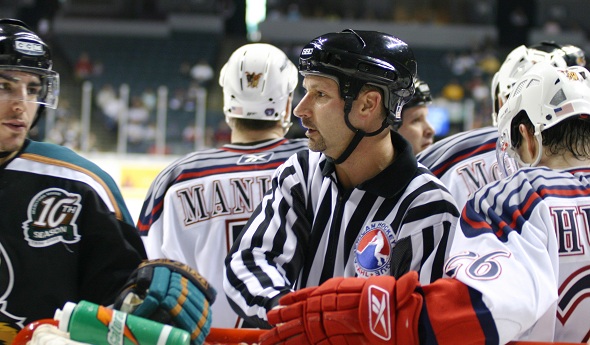
Garofalo: On-Ice Teacher and Recruiter
By
Rob Kaminski
MHSAA benchmarks editor
December 28, 2012
Something caught his eye as Allen Park’s Jim Garofalo circled the Olympic hockey rink in Salt Lake City to familiarize himself with the surroundings prior to the start of play at the 2002 Games.
“When the dimensions of a rink are laid out, everything is measured from the exact center of the ice outward,” Garofalo explains. “Usually there’s a washer or something small under the surface at center ice. All measurements are taken from there.
“Well, in Salt Lake City that year, a Canadian company was hired to prepare the sheets of ice, and they used a Loonie (common term for a Canadian $1 coin) to mark center ice. That year, the Canadians beat the United States in the gold medal game and won the Olympics on U.S. soil. I later visited the Hockey Hall of Fame in Toronto, and that Loonie is there.”
As Garofalo was getting acquainted with Canadian currency, an invitation in his mailbox back home went unanswered. At the time, MHSAA Tournament invitations were still sent by mail, so Garofalo was unaware the Association was awaiting his RSVP to accept his first Finals assignment.
“I was in Salt Lake City and had no idea. Now, of course, everything is online and by email, but that just shows how rapidly technology has progressed in the last 10 years,” Garofalo said. “So, (fellow official) Dan DiCristofaro calls and says something like, ‘Hey, do you want your state final?’ It was pretty funny; the running joke afterward was that you’ve gotta work the Olympics to get a shot at the state finals.”
Of course, that’s not the case. And, if Garofalo had it his way, all hockey officials who worked hard, persevered, paid their dues and set that as a goal would get a shot at the MHSAA Finals.
A 25-year registered MHSAA official who at one time juggled rules books for eight different hockey leagues and has worked four World Championships in addition to the Olympics, Garofalo now works only high school hockey.
“From a selfish standpoint, I suppose, I like a season that has a definite start and end to it,” says the New Boston Middle School social studies teacher, whose resume’ at one point looked like an endless Scrabble hand that included abbreviations for USA, USA Junior, Ontario, East Coast, International, International Independent and Central Collegiate hockey leagues in addition to the MHSAA.
“Being a teacher, there’s so much about the high school game that fits into education,” said Garofalo, now in his 10th year with the New Boston Huron District. “There’s so much to learn, and to help people learn at this level, from a playing and officiating standpoint.
“The people who officiate high school hockey are dedicated to improving, and as a veteran there’s an opportunity to help them learn and advance,” he says. “And, the coaches deserve kudos too. They are usually more professional and ask questions more properly than at other amateur levels. The reason is a direct result of them being accountable. They’ve got to answer to their principal or athletic director. Who are the junior and community league coaches accountable to? No one.”
 And, there’s another allure to the school game compared to which other levels pale.
And, there’s another allure to the school game compared to which other levels pale.
“The atmosphere of high school hockey is better than any other amateur level,” Garofalo says. “You go do a game at Trenton, and there’s a band. How many hockey games do you go to where there’s a band? Detroit Catholic Central and Birmingham Brother Rice have their cheering sections. It’s just a great atmosphere.”
It’s a scene that would surely help maintain the roster of younger, driven hockey officials. The trick is getting them there, according to Garofalo, one of the MHSAA’s biggest proponents for advancement and recruitment of officials.
Part of the issue is the oversaturation of games that fill Mite, Midget and other amateur schedules. Those who simply want a paycheck are never at a loss for work as long as they know how to skate.
“Hockey is unique because high school hockey is in progress at the same time as USA Hockey. An official can get twice the pay at a Bantam/Midget doubleheader than they can for one high school game,” Garofalo said. “The trouble is, who is instructing them? Who’s helping them to develop?”
To that end, Garofalo, DiCristofaro and the rest of the Northeast Hockey Referees Association established a $500 college scholarship. The recipient must be a high school hockey player who is officiating games in USA Hockey. Once they graduate from high school, many join the Association to work high school hockey.
Garofalo also offers other recruiting initiatives. In the Michigan Interscholastic Hockey League most schools play JV/Varsity doubleheaders, where the officials often let a linesman work a game at referee, while the experienced referee observes.
“At events like the Trenton Showcase, if we divide the fees differently we could get more officials involved,” he suggests. “We can do four-person crews to get our good young people some varsity experience as linesmen, and move some of our experienced linesmen to referee on the same crew with some of the top referees.”
It’s the kind of continual teaching that perpetuates the quality of officiating, and it takes time. The goal is to have the officials ready to perform when they hit the ice.
“If I put you out there to referee or pull lines, I set you up to succeed,” Garofalo says. “If I put people in too soon, I’ve set them up to fail, which leads to them leaving the game, and I haven’t done my job.”
The expectations and production of teacher and student must mesh for the system to work as intended. It requires patience as officials strive to climb the ladder, a bit of a lost art in today’s society.
“The culture of newer officials today is different. It’s a culture of immediate gratification,” says Garofalo. “Very few want to hang around eight to 10 years as a linesman before they referee, or move up. There are some very good officials who leave each year, because they haven’t become a referee, or haven’t got a tournament assignment.”
At the MHSAA Finals, Garofalo and DiCristofaro assist Jim Gagleard and the Livonia Ice Hockey Officials in heading up the off-ice officials. The inclusion and experience of such officials serves as a motivational tool which leads to improvement and retention. He also believes a four-person system in the MHSAA tournament would not only afford more qualified officials an opportunity for postseason assignments, but also provide better ice coverage as the sport’s speed has increased dramatically.
Not everyone can reach the summit, no matter the level. Even Garofalo himself, who once entertained dreams of skating in the NHL.
“The NHL looked at me a bit, but when I was at that age, it seemed all of the other linesmen were in their prime,” he said. “It is what it is.”
But, for a guy who began officiating at age 15 just to help pay for his hockey equipment, things have turned out quite well. In addition to the 2002 Olympics, Garofalo worked the Women’s World Championships in 1990, and the Men’s Worlds in Switzerland (1998), Norway (1999) and Germany (2001), working the Gold Medal game in 1998 and 1999. He’s been a fixture at the MHSAA tournament during the last dozen years.
“My wife, Mary Beth, says, ‘Wherever you go, you know someone.’ I owe that to officiating; the places I’ve gone and the people I’ve met,” Garofalo said. “It’s taken me all over the country instructing, and even overseas for some assignments. I can’t help but know people. It’s a people business.”
It might seem odd for Garofalo to even utter those words, describing the people-person this once shy kid has become. That’s one of the many rewards officiating delivers which is more valuable than any top-level assignment or game fee.
“I was quiet when I was younger. Well, when a coach is going crazy and yelling, you’ve got to speak for yourself. You learn conflict resolution,” Garofalo says, continuing as if he wrote the book on it. “‘Coach, get off the bench, quit screaming, and I’ll explain what I saw and why I called it the way I did. Then , if you have a question, I’ll answer it.’ You learn to communicate with people who don’t always agree with you.”
Then, there are the memories. Memories won’t buy a thing, but they go a long way in making 25 years on the ice, thousands of miles on the road, and countless hours away from home worth a million bucks.
“I worked 25 years for the IHL and AHL, and two years ago at the end of the regular season I was doing a Grand Rapids Griffins game. During the game, I told Brad May, ‘I’m done,’” Garofalo recalls, confiding in the gritty enforcer and one-time Stanley Cup champion who had more than 1,000 NHL games under his pads.
“At the end of the game, every guy and coach skated to me and shook my hand. Then Brad May says, ‘I heard you once worked the Olympics. It was an honor to be on the ice with you,’” Garofalo reveals, shaking his head. “Brad May said that to me.”
PHOTO: Jim Garofalo (center) officiate an NHL game. The Allen Park resident also has worked the Olympics.
NOTE: This is the sixth installment in the series "Making – and Answering – the Call" detailing the careers and service of MHSAA officials. Click the links below to view the others.

